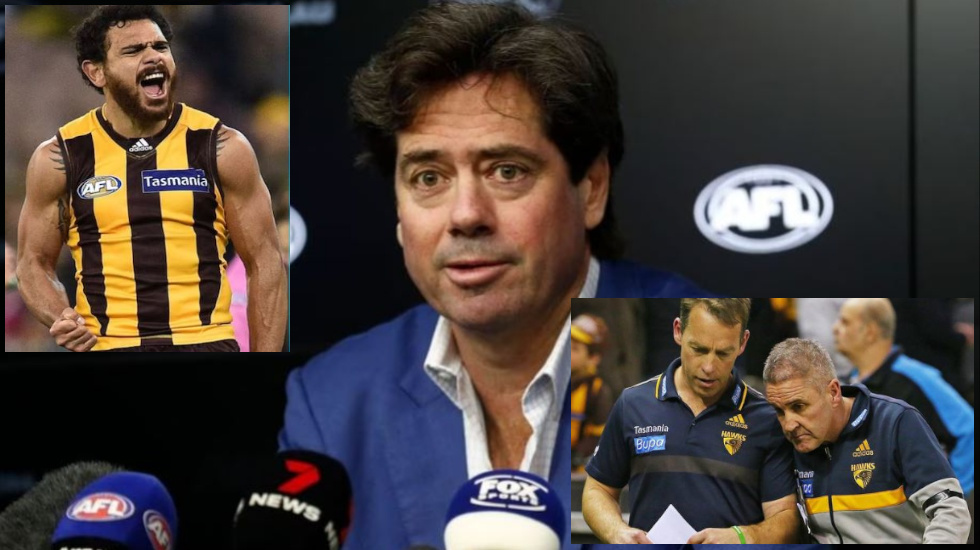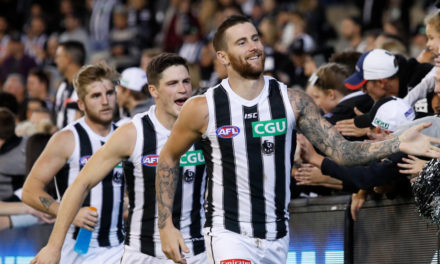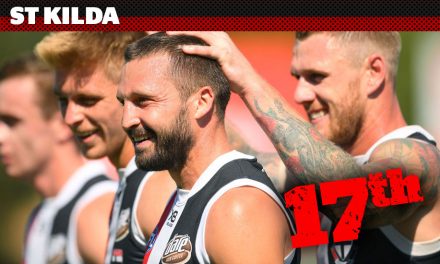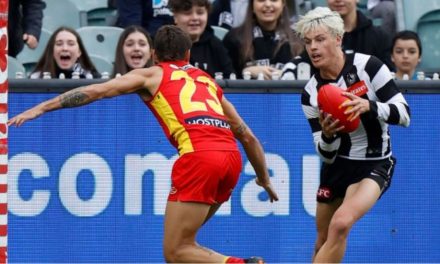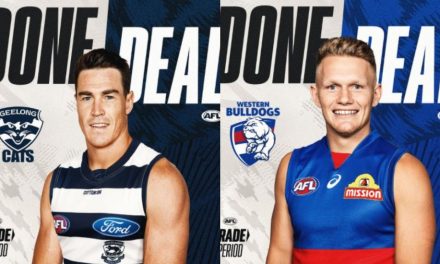AFL chief executive Gill McLachlan addresses Tuesday night’s media conference. (Left): Cyril Rioli. (Right): Alastair Clarkson and Chris Fagan
Right from the start, the saga of the Hawthorn racism investigation has been a finger-pointing exercise. So there was little likelihood things were going to change much as the AFL brokered and announced its resolution without a resolution.
What strikes me most about the deeply unsatisfactory outcomes for all parties involved, though, is the extent to which the issues supposedly being examined and the intent behind Hawthorn’s initial inquiries have taken a back seat.
There was something a little “off” about the way it was all dumped publicly at a hastily-convened news conference on Tuesday evening, a pretty unusual sort of timeslot for such a big-ticket news item.
But there was something even more off in my view about a clearly peeved departing AFL chief executive Gil McLachlan almost welcoming the suggestion that Hawthorn could be open to significant penalties, including draft sanctions, for its part in the saga.
It’s not often clubs are so transparently thrown under the bus as the AFL hierarchy seemed quite happy to do to the Hawks over the matter.
The tone seemed more in keeping with that reserved for clubs involved in salary cap shenanigans, drug scandals and other associated mischief-making. Almost as if the public relations optics of a clumsily-instituted investigation were of more consequence to the game than allegations about treatment of AFL players and their families which, if they were proven, bordered on inhuman.
AFL sources apparently insist that the annoyance isn’t so much about reputational damage to the game, nor potential financial ramifications, both ongoing and in those already faced during the controversy now having spanned eight months, as it is about the lack of care afforded the respondents to Hawthorn’s internal queries about their treatment by the club.
There’s said to be anger by the AFL towards the Hawks that the club didn’t put necessary safeguards in place to minimise any resultant trauma from their gruelling experience, ditto the alleged lack of a clear path forward once the questions had been asked.
Fair enough the league be annoyed on those grounds, too. But it might want to pause for a moment and reflect before it gets too self-righteous given its own history of dealing with difficult, nuanced situations, and particularly, its failure to act swiftly and appropriately in 2015 when Adam Goodes was being publicly hounded out of the game.
Hawthorn, having been alerted last year via the disconnection of a former great in Cyril Rioli towards his old club, and rightfully conscious of its historical position of having been a club less accepting of Indigenous players than others, was moved enough to at least initiate a fact-finding process about the extent of potential problems regarding cultural sensitivities.
It could have just ignored Rioli’s comments and waited for an inevitably brief storm to subside; it could have shrugged off the continued odd barb about its past and merely rattled off names like Rioli, Burgoyne and Franklin in response. Obfuscation and denialism would have been far a less potentially troublesome course of action. But the Hawks at least were concerned enough to want to know more.
If the AFL were genuine about safety of and protection of Indigenous players being the highest priority, and not merely brand protection, wouldn’t the inadequacies of the Hawthorn process be mitigated at least some by the demonstrated good intentions?
And if we’re going to do the tit-for-tat thing here, couldn’t the Hawks now turn back the clock eight years or so, and rightly ask: “So what did the AFL do when it became apparent Goodes was becoming a target for widespread racist abuse?” The answer, of course, if you happened to be living on Mars at the time, was a big, fat nothing.
PLEASE HELP US CONTINUE TO THRIVE BY BECOMING AN OFFICIAL FOOTYOLOGY PATRON. JUST CLICK THIS LINK.
Yes, McLachlan and his peers have subsequently apologised for that failure. But the important point in the context of the Hawthorn investigation is that even the far more visible abusing of Goodes, not just from some feral football-goers, but via the opinion columns of major newspapers (which also happened to be commercial partners of the AFL) didn’t spark AFL action.
If ever there was a far more cut-and-dried case of wrongs needing to be righted, the Goodes disgrace was it.
But even that shameful episode wasn’t enough to have the league for once not wait to smell the breeze of public sentiment and just do what was morally obviously the right thing. So how can it get all high-handed about the course Hawthorn steered in this case? At least there was one. Not a metaphoric covering of the eyes hoping it would all go away.
The leaking into the public domain of the Hawthorn investigation as early in the process as it was meant the writing was on the wall pretty early in terms of potential outcomes. But it’s been sad also to see some, let’s say incongruous positions taken by various football stakeholders about certain elements of the investigation.
ABC journalist Russell Jackson, who broke the story of the investigation, has been a particular target for agitated fans, which you’d expect, but also some jealous football media types, who aren’t as keen to defend Jackson as they might others even though it has been stated now several times that Alastair Clarkson, Chris Fagan and Jason Burt were at least given an opportunity to respond to the allegations before the ABC story was published.
Jackson, the author of previous pieces on the tragedy of former St Kilda star Rod Owen, the scourge of pedophilia that was present in the old VFL Little League, and the mistreatment of former St Kilda player Robbie Muir, among others, has been responsible for the best Australian sports journalism of recent years. I’ll be backing his integrity over that of some of his so-called journalistic peers every day of the week.
And even that side-issue is perhaps also symbolic of this episode as a whole. Which is that this is an incident and a conversation which requires nuance. And sadly, in a world which has less time or patience than ever for nuance, for malice-free genuine debate, and for genuine shades of grey when black-and-white (literally in this case) is so much easier to narrate.
For example, Clarkson et al were given the opportunity to address the allegations in Jackson’s story. But was the claimed 48-hour time frame enough time in this case given the magnitude the story? I think so, but that is at least a debate.
Were the allegations levelled at the Hawthorn trio more a case of “he said, she said”, or indeed, agreed facts being interpreted significantly differently thanks to a cultural miscommunication? Both scenarios are possible.
And did Hawthorn, in trying to do the right thing, end up doing the wrong thing. Yes, quite possibly.
That’s how I’m seeing it, anyway. But Hawthorn’s crime wasn’t so great it deserved the public scorn of the AFL publicly rained upon it. So even as the league has attempted to bring some sort of closure to a difficult, complex situation replete with contradictions, it has inadvertently created another.
Not your finest hour, guys.
This article first appeared at ESPN.

